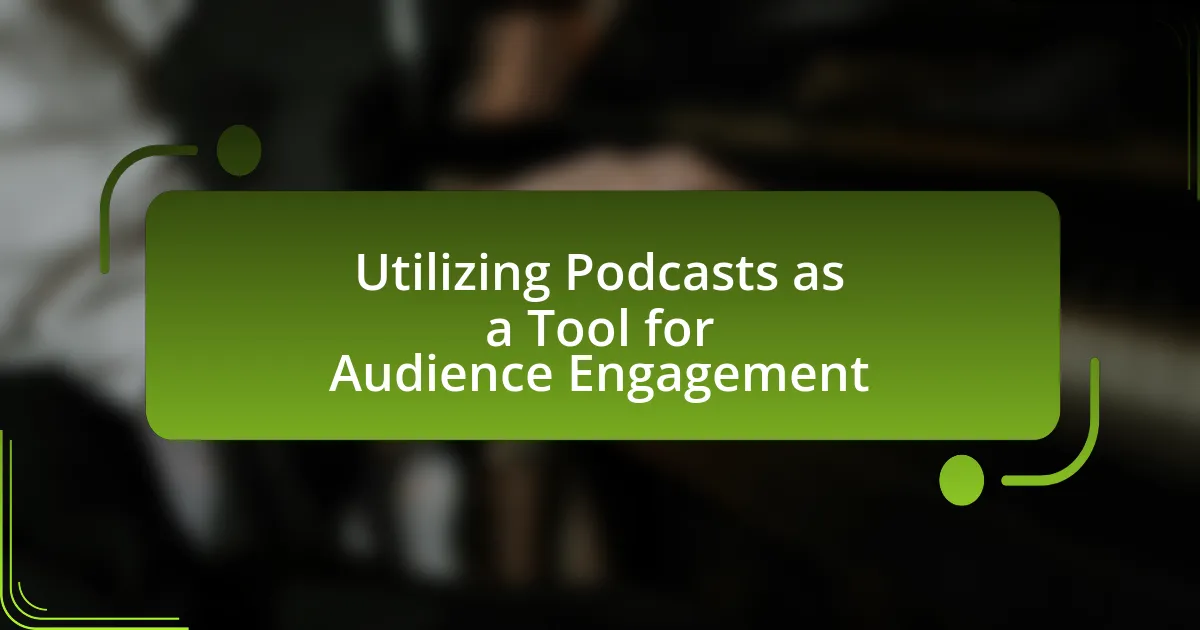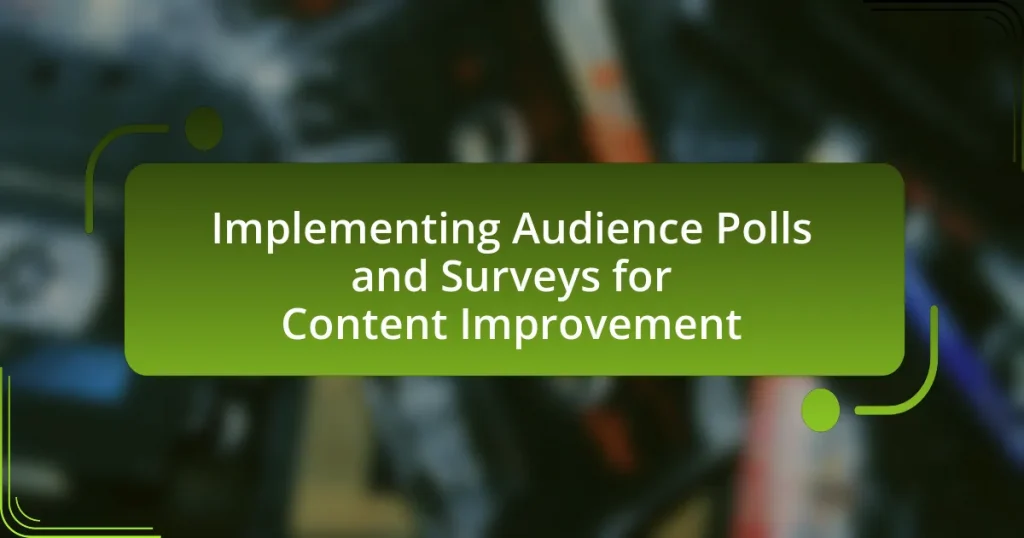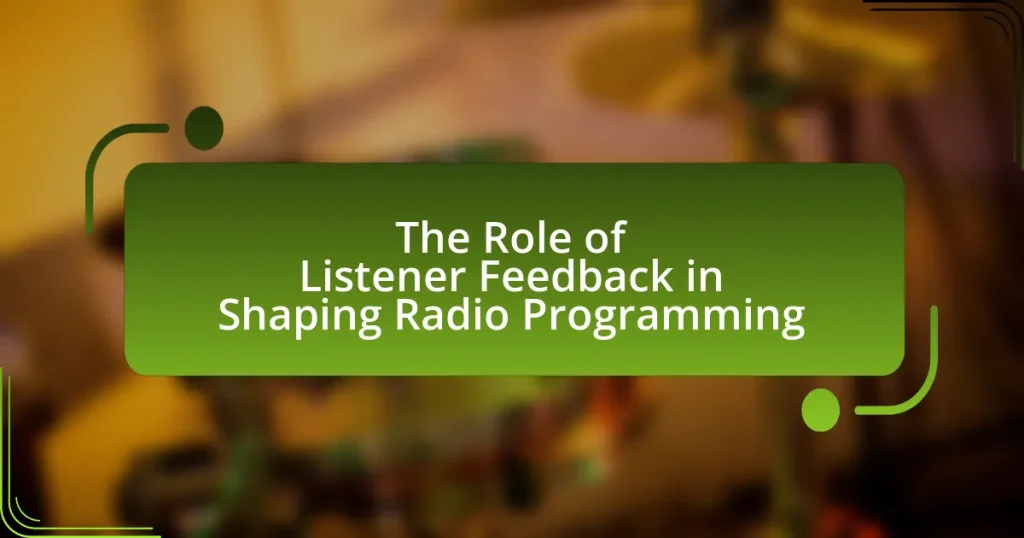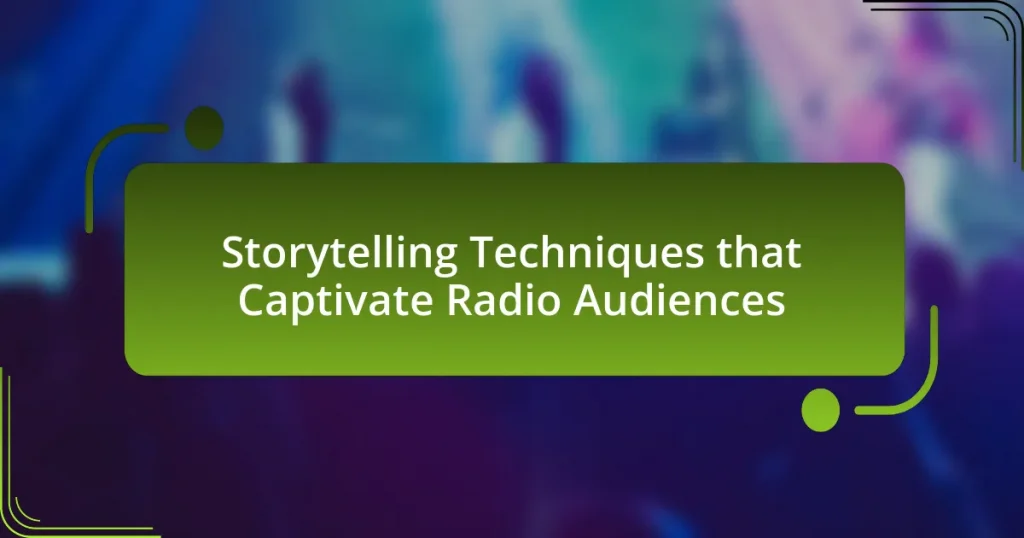Podcasts are digital audio files that engage audiences by providing accessible, on-demand content across various topics. The article explores how podcasts foster audience engagement through storytelling, community interaction, and consistent content delivery. It highlights the effectiveness of podcasts in building brand loyalty and discusses key elements for successful podcasting, including compelling content and audience participation. Additionally, the article addresses challenges in audience retention and content saturation, while offering strategies for promoting podcasts and integrating listener feedback to enhance engagement.
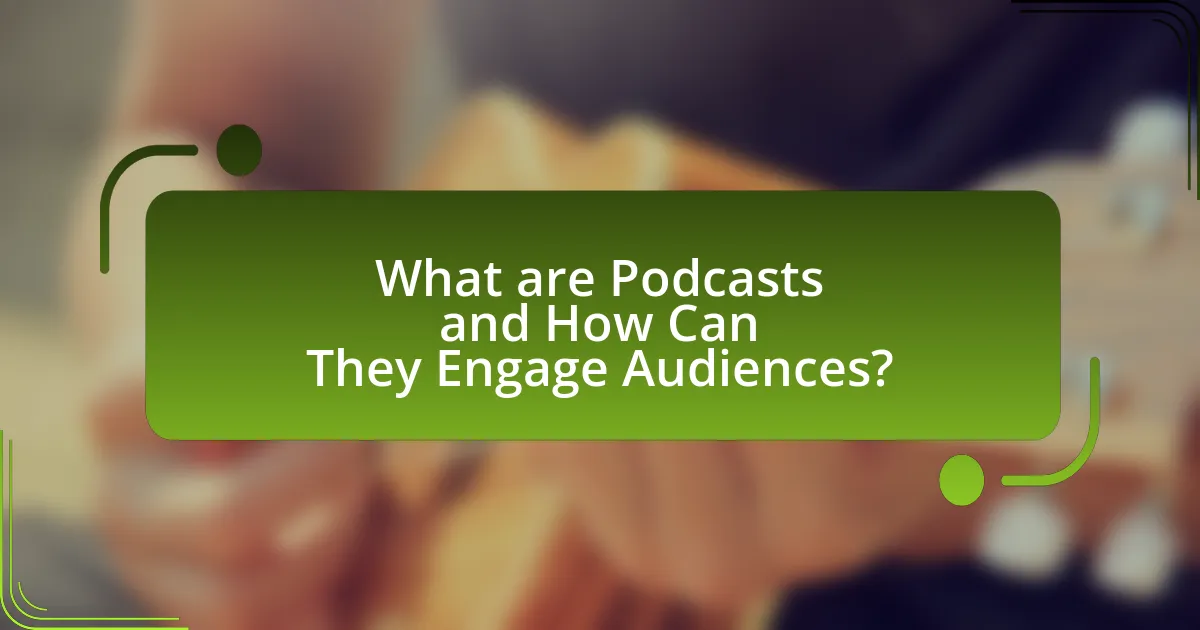
What are Podcasts and How Can They Engage Audiences?
Podcasts are digital audio files available for streaming or download, typically organized into episodes and series, allowing listeners to engage with content on various topics. They engage audiences by providing accessible, on-demand content that can be consumed during daily activities, such as commuting or exercising. According to Edison Research, as of 2023, 62% of Americans aged 12 and older have listened to a podcast, indicating a growing popularity and engagement with this medium. Additionally, podcasts foster community through listener interaction, such as feedback and discussions, enhancing audience connection and loyalty.
What makes podcasts an effective medium for audience engagement?
Podcasts are an effective medium for audience engagement due to their ability to create a personal connection through storytelling and audio intimacy. This format allows listeners to consume content while multitasking, leading to higher retention rates; studies show that 80% of podcast listeners complete episodes, compared to lower engagement rates in other media. Additionally, the conversational tone of podcasts fosters a sense of community, encouraging listener interaction and loyalty. The accessibility of podcasts across various platforms further enhances their reach, making them a versatile tool for engaging diverse audiences.
How do podcasts differ from other forms of media in engaging audiences?
Podcasts engage audiences differently than other media by offering an intimate, on-demand listening experience that fosters a personal connection. Unlike traditional media, which often relies on visual elements and scheduled programming, podcasts allow listeners to consume content at their convenience, leading to higher retention rates. Research indicates that 80% of podcast listeners complete an episode, compared to lower engagement rates in television and radio. This high completion rate enhances the likelihood of audience loyalty and deeper emotional connections, making podcasts a unique tool for engagement.
What are the key elements of a successful podcast that enhance audience engagement?
Key elements of a successful podcast that enhance audience engagement include compelling content, consistent publishing schedules, and interactive audience participation. Compelling content captivates listeners by addressing relevant topics, storytelling, and expert interviews, which can lead to higher retention rates. Consistent publishing schedules build listener habits, as research shows that regularity fosters loyalty and anticipation among audiences. Interactive audience participation, such as Q&A sessions or social media engagement, creates a sense of community and investment, further enhancing listener connection and engagement.
Why is audience engagement important for content creators?
Audience engagement is crucial for content creators because it fosters a connection between the creator and their audience, leading to increased loyalty and retention. Engaged audiences are more likely to share content, provide feedback, and participate in discussions, which enhances the visibility and reach of the creator’s work. According to a study by HubSpot, 70% of marketers say that engaging with their audience is key to their success, highlighting the importance of interaction in building a community around content. This interaction not only boosts the creator’s credibility but also drives higher conversion rates, as engaged audiences are more likely to take action, such as subscribing or making purchases.
How does audience engagement impact brand loyalty?
Audience engagement significantly enhances brand loyalty by fostering a deeper emotional connection between consumers and brands. Engaged audiences are more likely to develop trust and affinity towards a brand, leading to repeat purchases and advocacy. Research indicates that brands with high engagement levels can see a 23% increase in customer loyalty, as engaged customers feel valued and understood. This connection is often cultivated through interactive content, such as podcasts, which allow brands to communicate directly with their audience, share stories, and create a community around shared interests.
What metrics can be used to measure audience engagement in podcasts?
Key metrics to measure audience engagement in podcasts include download numbers, listener retention rates, average listen duration, and audience feedback. Download numbers indicate the reach of the podcast, while listener retention rates reveal how many listeners stay engaged throughout the episode. Average listen duration provides insight into how long listeners are actively engaged, and audience feedback, such as reviews and ratings, offers qualitative data on listener satisfaction and engagement levels. These metrics collectively help podcasters assess the effectiveness of their content and audience connection.

How Can Podcasts Be Utilized for Audience Engagement?
Podcasts can be utilized for audience engagement by creating interactive content that encourages listener participation. Engaging formats such as Q&A sessions, listener feedback segments, and live recordings foster a sense of community and connection. According to a 2021 report by Edison Research, 54% of podcast listeners feel a personal connection to the hosts, which enhances engagement. Additionally, incorporating social media platforms to promote discussions around episodes can further increase audience interaction and investment in the content.
What strategies can be employed to create engaging podcast content?
To create engaging podcast content, utilize storytelling techniques, incorporate expert interviews, and maintain a consistent format. Storytelling captivates listeners by creating emotional connections, as evidenced by research from the University of California, which found that narratives can enhance memory retention by up to 65%. Expert interviews provide credibility and diverse perspectives, making the content more informative and appealing; a study by the Podcast Host indicates that episodes featuring guests can increase listener engagement by 30%. Maintaining a consistent format helps establish familiarity, which encourages audience loyalty, as shown by data from Edison Research, revealing that 75% of podcast listeners prefer shows with a regular structure.
How can storytelling enhance audience connection in podcasts?
Storytelling enhances audience connection in podcasts by creating relatable narratives that evoke emotions and foster engagement. When hosts share personal experiences or compelling stories, listeners are more likely to feel a sense of intimacy and connection, as evidenced by research from the University of California, which found that storytelling activates the brain’s mirror neurons, making listeners more empathetic and engaged. This emotional resonance encourages loyalty and a deeper relationship between the audience and the podcast, ultimately leading to increased listener retention and interaction.
What role does guest participation play in engaging listeners?
Guest participation significantly enhances listener engagement by introducing diverse perspectives and fostering a sense of community. When guests share their unique insights and experiences, they create relatable content that resonates with the audience, making the podcast more appealing. Research indicates that podcasts featuring guests often experience higher listener retention rates, as the dynamic conversations stimulate interest and encourage interaction. For instance, a study by Edison Research found that 61% of podcast listeners are more likely to engage with content that includes guest interviews, highlighting the effectiveness of this approach in capturing and maintaining audience attention.
How can podcasts be promoted to reach a wider audience?
Podcasts can be promoted to reach a wider audience through strategic marketing techniques such as leveraging social media platforms, collaborating with influencers, and optimizing for search engines. Social media platforms like Instagram, Twitter, and Facebook allow podcasters to share snippets, engage with listeners, and create community discussions, which can significantly increase visibility. Collaborating with influencers who have established audiences can introduce the podcast to new listeners, as their endorsements often carry weight. Additionally, optimizing podcast titles, descriptions, and episode content with relevant keywords enhances discoverability on platforms like Apple Podcasts and Spotify, where search functionality plays a crucial role in audience growth. According to a 2021 report by Edison Research, 41% of Americans aged 12 and older have listened to a podcast in the past month, indicating a growing audience that can be tapped into through effective promotional strategies.
What social media strategies are effective for podcast promotion?
Effective social media strategies for podcast promotion include leveraging targeted advertising, engaging with listeners through interactive content, and utilizing cross-promotion with other podcasts. Targeted advertising on platforms like Facebook and Instagram can reach specific demographics, increasing visibility; for instance, Facebook reports that ads can reach over 2.9 billion users, allowing for precise audience targeting. Engaging with listeners through polls, Q&A sessions, and live interactions fosters community and encourages sharing, which can amplify reach. Additionally, cross-promotion with other podcasts can introduce your content to new audiences, as studies show that 70% of podcast listeners discover new shows through recommendations. These strategies collectively enhance audience engagement and expand the podcast’s reach effectively.
How can collaborations with other podcasters enhance audience reach?
Collaborations with other podcasters can significantly enhance audience reach by leveraging each other’s listener bases. When two podcasters collaborate, they introduce their content to each other’s audiences, effectively doubling the potential reach. For instance, a study by Edison Research found that 54% of podcast listeners discover new shows through recommendations from other podcasts. This cross-promotion not only increases visibility but also builds credibility, as audiences are more likely to trust recommendations from familiar voices. Additionally, collaborations can lead to shared marketing efforts, such as joint social media promotions, further amplifying audience engagement and growth.
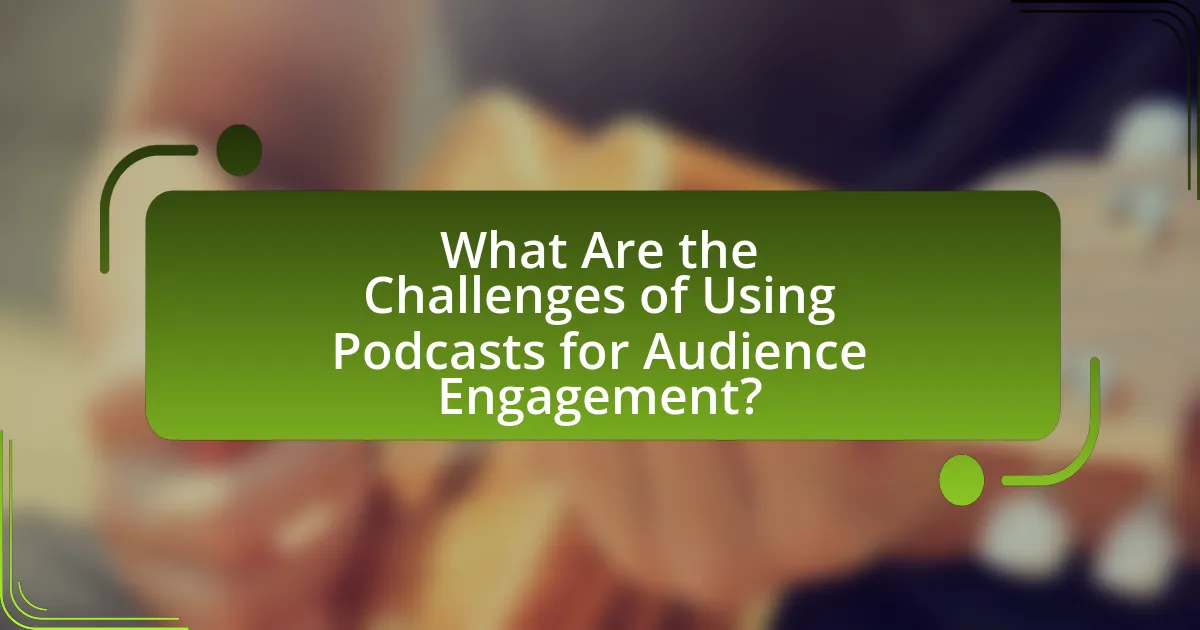
What Are the Challenges of Using Podcasts for Audience Engagement?
The challenges of using podcasts for audience engagement include audience retention, content saturation, and measurement of effectiveness. Audience retention is difficult because listeners may drop off after a few minutes, with studies indicating that only about 25% of listeners typically stay engaged for the entire episode. Content saturation poses a challenge as the podcast market has grown significantly, with over 2 million podcasts available, making it hard for new shows to stand out. Additionally, measuring the effectiveness of podcasts can be complex due to the lack of standardized metrics, making it challenging for creators to assess listener engagement and reach accurately.
What common pitfalls should content creators avoid when producing podcasts?
Content creators should avoid several common pitfalls when producing podcasts, including poor audio quality, lack of planning, and inconsistent publishing schedules. Poor audio quality can alienate listeners; research shows that 70% of podcast listeners abandon episodes due to bad sound. Lack of planning leads to disorganized content, which can confuse the audience and diminish engagement. Additionally, inconsistent publishing schedules can disrupt audience expectations, as 60% of listeners prefer regularity in episode releases. By addressing these issues, content creators can enhance listener retention and engagement.
How can technical issues affect audience engagement?
Technical issues can significantly diminish audience engagement by disrupting the listening experience. When podcasts encounter problems such as poor audio quality, buffering, or connectivity issues, listeners are likely to become frustrated and may abandon the content altogether. Research indicates that 70% of listeners will stop listening to a podcast if the audio quality is subpar, highlighting the critical role of technical reliability in maintaining audience interest. Furthermore, consistent technical difficulties can lead to negative perceptions of the brand or content creator, ultimately reducing listener loyalty and engagement over time.
What are the challenges of maintaining consistent content quality?
Maintaining consistent content quality in podcasts presents several challenges, including varying production standards, fluctuating audience expectations, and the need for ongoing creativity. Production standards can differ based on equipment, editing skills, and technical knowledge, leading to inconsistencies in audio quality and overall presentation. Audience expectations can shift over time, influenced by trends and competitor offerings, making it difficult to meet listener demands consistently. Additionally, the requirement for fresh and engaging content can strain creators, as they must continually innovate while adhering to a quality standard. These factors collectively contribute to the difficulty of sustaining high-quality content in podcasting.
How can feedback be effectively gathered from podcast audiences?
Feedback can be effectively gathered from podcast audiences through surveys, social media engagement, and direct listener outreach. Surveys can be distributed via email or podcast platforms, allowing listeners to provide structured feedback on content, format, and topics. Social media engagement enables real-time interaction, where podcasters can ask questions and encourage comments on episodes. Direct outreach, such as listener call-ins or email correspondence, fosters a personal connection and invites detailed feedback. According to a study by Edison Research, 70% of podcast listeners prefer to engage with creators through social media, highlighting its effectiveness as a feedback tool.
What tools can be used to collect listener feedback?
Surveys and feedback forms are effective tools for collecting listener feedback. These tools can be distributed through various platforms, such as email, social media, or directly on podcast hosting sites. For instance, platforms like SurveyMonkey and Google Forms allow creators to design customized surveys that can capture specific listener insights. Additionally, podcast hosting services often include built-in analytics and feedback options, enabling creators to gather data on listener preferences and engagement levels. This approach is supported by research indicating that direct listener engagement through surveys can significantly enhance audience satisfaction and retention.
How can audience feedback be integrated into future podcast episodes?
Audience feedback can be integrated into future podcast episodes by systematically collecting and analyzing listener responses through surveys, social media interactions, and direct feedback channels. This approach allows podcast creators to identify popular topics, preferred formats, and areas for improvement, ensuring that content aligns with audience interests. For instance, a study by Edison Research found that 70% of podcast listeners appreciate when creators respond to their feedback, indicating that engagement can enhance listener loyalty and satisfaction. By implementing changes based on this feedback, podcasters can create more relevant and engaging content, ultimately fostering a stronger connection with their audience.
What are the best practices for maximizing audience engagement through podcasts?
To maximize audience engagement through podcasts, creators should focus on delivering high-quality content that resonates with their target audience. Engaging storytelling, relevant topics, and a consistent release schedule are essential elements. Research indicates that podcasts with a clear narrative structure and relatable hosts tend to retain listeners better, as evidenced by a 2021 study from Edison Research, which found that 80% of podcast listeners prefer shows that tell a story. Additionally, incorporating listener feedback and interactive elements, such as Q&A sessions or polls, can further enhance engagement, as these practices foster a sense of community and involvement among the audience.
How can podcasters create a community around their content?
Podcasters can create a community around their content by actively engaging with their audience through social media, listener feedback, and dedicated online platforms. Engaging with listeners on social media allows podcasters to foster discussions, share behind-the-scenes content, and respond to audience inquiries, which builds a sense of belonging. Additionally, soliciting listener feedback through surveys or direct messages helps podcasters understand their audience’s preferences and interests, further enhancing community involvement. Establishing dedicated online platforms, such as forums or Facebook groups, provides a space for listeners to connect with each other and the podcaster, facilitating deeper relationships and ongoing conversations. Research indicates that communities built around shared interests, such as podcast content, can significantly enhance listener loyalty and engagement, as evidenced by the growth of podcast fan groups on platforms like Reddit and Facebook.
What techniques can be used to encourage listener interaction and participation?
Techniques to encourage listener interaction and participation include asking open-ended questions, incorporating polls or surveys, and utilizing social media for real-time feedback. Open-ended questions invite listeners to share their thoughts and experiences, fostering a sense of community. Polls or surveys can be integrated into episodes or shared via platforms like Instagram or Twitter, allowing listeners to engage actively with the content. Social media serves as a dynamic channel for listeners to comment, share, and discuss episodes, enhancing their involvement. Research shows that interactive elements in podcasts can increase listener retention and satisfaction, as evidenced by a study from Edison Research, which found that 54% of podcast listeners enjoy engaging with content through social media.
